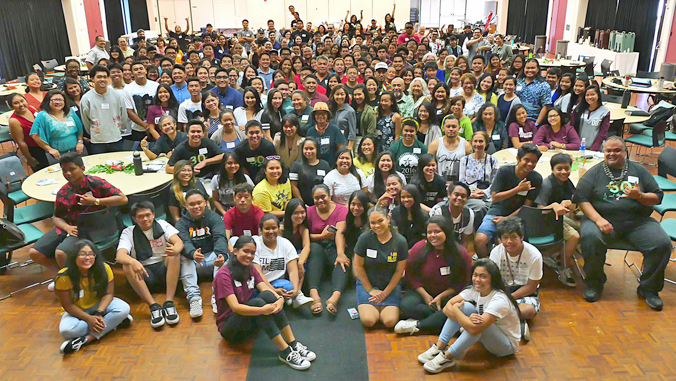
A University of Hawaiʻi Filipino advocacy group just hit a huge milestone. The Pamantasan Council celebrated its 30-year anniversary at the Pamantasan Conference on October 5 at UH Mānoa with its largest attendance ever. Pamantasan is the Filipino translation for “institute of higher learning.”
About 300 students, faculty, staff and administrators from across the 10 UH campuses took part in various workshop sessions, cultural activities, and a book and curriculum fair focused on prevalent issues for Filipinos and higher education.
The conference was themed #BeKindToAStudent, in honor of the late Ernest “Niki” Libarios, Jr., who lived by the personal mantra. As director of the Office of Student Academic Services in UH Mānoa’s College of Education, Libarios was a champion for the Filipino community and recognized the importance of positive educational experiences among students. He was the creator of the “Be a hero. Be a teacher.” campaign.
Since its founding in 1987, the Pamantasan Council has advocated for the increased representation of Filipino-Americans and Philippine courses in higher education, as well as to support and recognize Filipino achievements.
Today, Filipinos comprise just under a quarter of all student enrollment in Hawaiʻi‘s public schools. This makes them the second largest ethnic group, behind only Native Hawaiians. Still, they represent only 13 percent of all students in the UH System. Most enroll in UH’s community colleges and remain underrepresented in UH’s four-year institutions. At UH Mānoa, only 10 percent of students identify as Filipino. In addition, only 7 percent of Hawaiʻipublic school teachers and 4 percent in the UH System are of Filipino ancestry.
Opening the conference was up-and-coming rapper Ruby Ibarra, who spoke about her struggles growing up and overcoming them after moving from the Philippines to the San Francisco Bay Area at age 4.
Rzenseth Cabansag, a senior at Farrington High School who plans to attend UH Mānoa’s Shidler College of Business, said she came in part to hear Ibarra speak about being Filipino-American. “I think it’s important to preserve that, to help me understand what it’s like to grow up as an immigrant in the U.S., and just keeping true to yourself,” she said.
Leon Florendo, a counselor with Waiʻanae Moku at Leeward Community College and a coordinator for this year’s conference, said the record attendance speaks to the great progress of Libarios’ legacy and work with students, as well as the Filipino-American faculty and staff at UH who are promoting Pamantasan. “More Filipinos are proud of their contributions to the university and the state of Hawaiʻi, and a higher education degree gives you more opportunities to do more,” he said.
“It’s a great feeling knowing that there are a lot of like-minded individuals who know the struggles of being Filipino-American, the pressure we get from family and going into professional pathways,” said Richard Jay Aglugub, who is pursuing his master’s degree in educational administration in higher education at UH Mānoa. “It’s good to see people write their story and I’m excited to be part of all of this.”
Amy Agbayani, emeritus assistant vice chancellor for student diversity and a member of the 1988 UH Task Force on Filipinos that recommended the establishment of the Pamantasan Council, reflected on its history. “Much has been accomplished over three decades to make our state and our university more inclusive of Filipinos and other underserved groups, but much more must be done to promote equity, excellence and diversity at each of our 10 campuses,” she said.
In addition to Florendo, conference co-coordinators were Christine Quemuel, interim assistant vice chancellor for diversity, and Patricia Halagao, professor and chair of the Department of Curriculum Studies in the College of Education.

